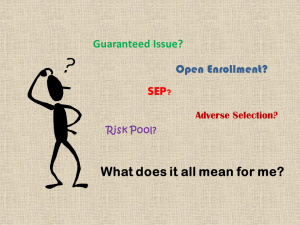 Health insurance policies with effective dates of January 1, 2014 or later cannot exclude people from coverage based on having a pre-existing condition. Guaranteed Issue is the term used to describe such policies. However, the fact that current or prior health history cannot be used to exclude a new customer does not mean that people can simply wait until a health condition arises and then get insurance.
Health insurance policies with effective dates of January 1, 2014 or later cannot exclude people from coverage based on having a pre-existing condition. Guaranteed Issue is the term used to describe such policies. However, the fact that current or prior health history cannot be used to exclude a new customer does not mean that people can simply wait until a health condition arises and then get insurance.
Open Enrollment and SEPs
Under the terms of the Affordable Care Act (ACA), health insurance may be purchased only during specific Open Enrollment periods each year. The only exception for purchasing individual or family insurance outside of Open Enrollment is the existence of a Special Enrollment Period (SEP). A SEP occurs when certain major life conditions occur: the birth of a child, marriage, loss of employer-sponsored health insurance, ending of COBRA benefits, a move out of the plan’s service area, etc.
Getting injured or ill and suddenly needing health insurance does not constitute grounds for a SEP!
Confusion about Guaranteed Issue and Open Enrollment periods may lead some to assume that they really do not need to enroll in an insurance plan, especially since the penalty for failure to enroll is so low. Some assume that Open Enrollment period limitations apply only to policies purchased through state or federal marketplaces. These assumptions are incorrect.
Those who fail to purchase insurance during the annual Open Enrollment period will not be able to purchase a policy from any insurer unless they qualify for a SEP. Moreover, despite the low monetary cost of the penalty for failure to enroll, the actual cost can become catastrophic. Seemingly minor injuries — a broken arm or leg — can result in thousands of dollars in hospital, doctor, and therapy charges. A major illness or injury — cancer, closed-head injury, stroke — can lead to hundreds of thousands of dollars in charges.
Insurance is a contract
An insurance policy is a contract between the person who buys it and the insurer who offers it. The purchaser agrees to pay a set amount of money on a regular schedule and the insurer agrees to pay a set portion of the cost of a financial loss, including health care expenses. Both parties must be legally able to enter into a contractual agreement at the time the contract is signed. An unconscious or seriously injured person cannot enter into a contract.
Protection from Adverse Selection
When the ACA was drafted, insurance companies worked with Congress to develop policies that would protect them from the devastating impact of adverse selection. Adverse selection refers to situations in which only those currently experiencing a loss purchase insurance against that loss. Insurance companies cannot provide protection only or primarily against currently occurring losses. They must have a large number of people who all put money together into one pool that can be tapped to pay for the losses experienced by a small number of them. This pool is known as a risk pool. Guaranteed issue policies greatly increase the risk of adverse selection. No insurer can reasonably consent to accepting such risk without some way to minimize it. As a result, the decision was made to control the degree of risk by limiting the time-frame during which insurance contracts can be purchased. Open Enrollment during a brief period each year was the solution, one proven effective by the history of Medicare. In recognition of the fact that things can change dramatically during the course of a year, the Special Enrollment Period option was included.
Bottom line?
Health insurance, whether through state and federal marketplaces or from private insurers, can only be purchased by individuals or families during the annual Open Enrollment Periods. This first year Open Enrollment is from October 1, 2013 to March 31, 2014.
Open Enrollment for individuals to purchase or renew policies effective January 1, 2015 will occur at the same time it does for Medicare: October 15 – December 7, 2014.
Outside of these Open Enrollment periods, it will not be possible to purchase an individual or family policy from any insurer at any price without the existence of a Special Enrollment Period’s special circumstances.
